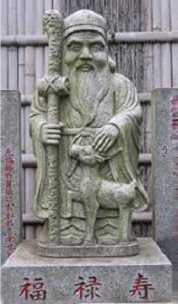Fukurokuju is one of the deities (fukunokami) of the Seven Lucky Gods of Japan (Shichifukujin); the other six being:

Fukurokuju is from an old Daoist god, who in turn is based on the old Chinese sage Lao Tzu, who had kept archives for the imperial court in the Sung dynasty. He was widely worshipped in China and renowned for performing miracles, particularly in the field of longevity and prosperity. Therefore he is the deity of wisdom, good luck, happiness, wealth, virility and longevity, as reflected in his name: fuku roku, "wealth from heaven"; and (cho)ju, "longevity".
Happiness, wealth and longevity are all relative terms. "Happiness" in Daoism is not the general happiness in the modern sense, rather it's being granted the heavenly blessing of having children.
Similarly "wealth" is not having more money and assets than other people, rather it's just having sufficient. Having insufficient wealth is undesirable, sufficient wealth is desirable, and excessive wealth is unnecessary.
And "longevity" is not just living to an old age, but is having good health for as long as you live.
Fukurokuju's depiction depends largely on the era, but a recurring description is his relatively short height, compensated by a long and/or thick beard. He is thought to share his body with Jurojin and indeed Fukurokuju's appearance is similar to Jurojin's, often carrying a folding ceremonial fan (ogi). The similarity between the two can lead to mistaken identity.
He uses a sturdy staff to support himself in his advancing years. On the staff is tied a parchment scroll (makimono) on which is written sacred teachings and all the wisdom of the world, plus details of every person on earth - presumably in very tiny writing.
When he's not wearing a scholar's cap we can see his dome-shaped head is bald. By his side might be a stag or deer (shika), a tortoise (kame) or a crane (tsuru), all symbolizing longevity.
As with Jurojin, Fukurokuju is said to be an incarnation of the Southern Pole Star (Sigma Octantis) which is barely visible to the naked eye if you're in the southern hemisphere. And even less visible in China, but was perfectly clear in the minds of Chinese sages. When seen near the southern horizon, it has a reddish hue and red is the colour of happiness, wealth and longevity in China.
The Southern Pole Star (or the Old Man of the South Pole) is the Daoist deification of Canopus.
With that is a legend about a boy named Zhao who was sick. His physician told him he was destined to die just before he reached the age of 20, and advised him to take some wine and food to two old men in a particular rice field. One of the men was an incarnation of the Northern Pole Star and the other of the Southern Pole Star.
The boy gave them the wine and food, and to thank the boy, they said they would give him anything he desired. He told the men he was destined to die before he was 19 years old, and asked whether they could they do anything about it.
According to Chinese cosmology, the Northern Pole Star fixes the date of a person's birth, and Southern Pole Star fixes the date of a person's birth death. Since the two men were incarnations of opposite ends of the cosmos, together they blessed the boy with opposing years of his demise; 19 became 91, and also with good health he would enjoy for the rest of his long life.
Consequently, the Southern Pole Star, and hence Fukurokuju, can bestow longevity on his worshippers.